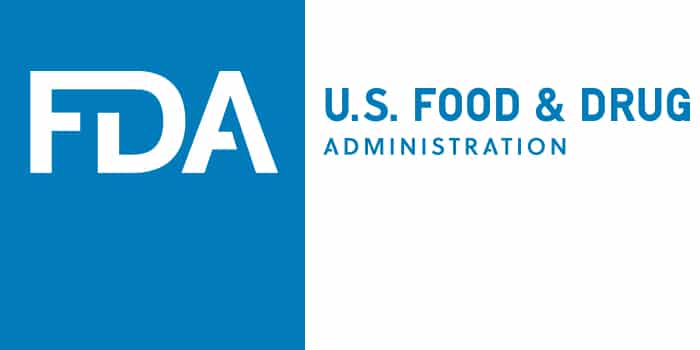FDA Still Unclear on CBD Safety

As companies consider cannabidiol (CBD) products and new CBD brands emerge, the Food and Drug Administration (FDA) is still vigilant in its quest to prove these products are safe. In a report submitted yesterday to Congress (a week past its due date) FDA commissioner Stephen Hahn noted the agency still lacks enough evidence to say CBD ‘can’t hurt.’ While the report notes the FDA is “actively considering potential pathways for certain CBD products to be marketed as dietary supplements,” the agency is still seeking more scientific evidence — especially to support CBD’s safety in food.
“It is not currently lawful to add CBD to human or animal food, and the data currently available to FDA raise safety concerns about the use of CBD in food,” the report notes. “We encourage interested parties to continue to develop and share with FDA information regarding whether there are conditions under which CBD could safely be added to food.” FDA must be cautious about the supplements, too. Take a look at what supplements are on sale on Walgreens Ad.
The FDA will use “science as our guide [to] determine the most appropriate path forward,” the report notes. Last week, Hahn said the FDA can’t prevent consumers from using these products, but the new report emphasizes that only one CBD product, prescription drug Epidiolex, which treats two rare pediatric epilepsy disorders, is FDA-approved — no other CBD products are. In November, the agency issued new warnings to companies and further noted observed side effects from its nonclinical review of Epidiolex — though other products, including food and drink items, have not been proven to cause the same effects. However, Hahn explained that some consumers assume CBD products are FDA-approved and that using CBD ‘can’t hurt.’ The agency remains committed to addressing this confusion, along with answering the public’s questions.
“We remain focused on educating the public about the number of questions that remain regarding CBD’s safety,” Hahn said in a statement yesterday. “There may be risks that need to be considered before using CBD products outside of the monitored setting of a prescription from your healthcare provider.”
Moving forward, the FDA has reopened the public docket originally established for its first public hearing on cannabis in June, hoping to receive more “relevant data” on the matter. FDA has also initiated its own testing, awarding a grant for a study on the effects of CBD exposure during pregnancy and starting a study with the University of Mississippi to evaluate the CBD and THC levels and their effects in topical cosmetics. However, the FDA did not announce further studies on CBD in food or beverages.
“FDA is not currently aware of a basis to conclude that CBD is generally recognized, among qualified experts, as safe for use in conventional foods,” the report said.
Ashish Talati, partner at law firm Amin Talati Wasserman, said that CBD food is “still in limbo” because food products have a higher safety threshold than supplements, since they can’t have warnings for pregnant women or children on labels. However, once the FDA has more data, he thinks it will become more “comfortable” with CBD in food and beverages. For now, he said, this update is positive because it solidifies a path toward approving CBD in dietary supplements — although a timeline is unclear.
“That’s where people are getting impatient — they’ve been saying for a long time now ‘when exactly [is the FDA] going to do this?’” Talati said. “For foods it seems not yet ready; it seems like [that] may have a longer timeline than supplements.”
Congress is also getting impatient, he noted, and will likely push the FDA to act faster. House Agriculture Committee Chairman Collin Peterson (D-MN) already introduced a bipartisan bill in January to allow hemp-derived CBD in supplements and conventional food products. To do that, hemp-derived CBD itself would need to be defined as a dietary supplement, overriding the section of the Federal Food, Drug & Cosmetic Act (FDCA) that outlaws it because of its approval in Epidiolex.
“The FDA’s concern is strictly on safety, so not focused on efficacy,” Talati noted. “They want to make sure when it’s in beverage and different foods and supplements — what are the long term impacts? Since they don’t have data, they’re hesitant.”
Many in the industry, however, think regulation is needed to help the market flow — and thus produce better data. The timeline for this has already dragged since hemp was federally legalized in the Farm Bill in 2018, Jonathan Miller, general counsel for U.S. Hemp Roundtable and law firm Frost Brown Todd, said, calling the report’s failure to address CBD in food is “disappointing.” Since hemp was just removed as a controlled substance in 2018, there likely aren’t many long term studies yet, and prolonging regulation encourages bad actors — many of which are already selling (and further complicating) the market, Miller said. Companies like Charlotte’s Web and CV Sciences, meanwhile, have both conducted public studies of their own proving CBD is safe — especially in the small quantities in which it’s usually consumed, Miller said.
“There’s no danger to public health or safety,” Miller said. “We’re hopeful that as reports continue to proliferate the FDA will change its position.”
Indeed, the FDA says it’s working quickly to obtain more information.
“FDA is exploring the most efficient ways to collect this needed information as quickly as possible, including leveraging collaborations to help address identified data gaps,” the report said. “A more extensive scientific agenda is under development, although, as is consistent with all areas of scientific exploration, scientific findings may signal additional research is needed.”
But to expedite this process, brands should pressure Congress, Miller advised.
“Go to Congress and let them know [you] support legislation to permit CBD use in dietary supplements and food and beverage,” he said. “The more grassroots and grasstops lobbying, the more effective it’ll be. Encourage them to act now.”
















